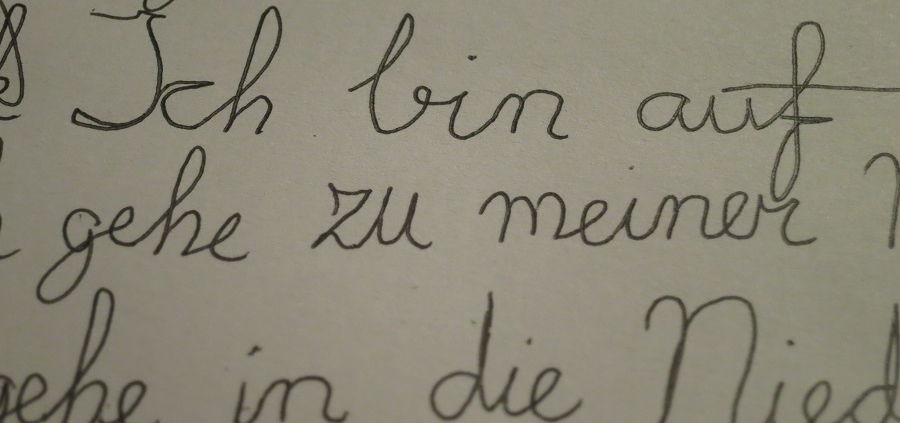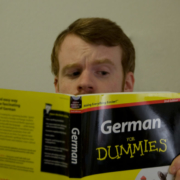5 absurd rules of the German language that once mastered make you feel complete
It’s not enough that it is a language with thousands of inflexible grammatical rules, with words that have a difficult meaning to perceive and sounds at times almost impossible to pronounce. German, despite its reputation of being a rational language, at times presents cases when these rules are not rationally justified and lead to absurd paradoxes. And for us wretched born under another mother tongue, but have to learn how to live with German, there is nothing left to do than to fight against these absurdities every day.
1. The gender of certain nouns
Skirt is male, girl is neutral. For English speakers this is a very confusing situation and the only way to survive out of it is to forget the universal the and simply accept the ambiguous gender assignment for German nouns. Although there are certain exceptions, for instance words that end in -ung are always feminine and those that end in -er are masculine, most of the nouns articles have to be learned by heart because there are no rules to rely upon. And in this condition of anarchy yes, you will have to learn by heart every single common noun of things, animals and so on. Wouldn’t it be nice if the gender was at least deductible from the meaning of the word? Yes, but no: because a skirt is male, and a girl is neutral.
Not to talk about the chaos caused when universal nouns that belong to the collective imagery not only have a gender in the German world, but also a quite confusing one. So then we have the moon (der Mond- M), the sun (die Sonne- F) and death (der Tod-M), as we learned from that famous scene of a chess match against death in the swedish movie The seventh seal. Yet again, this is a different story…

2. Two-digit numbers
Counting in German is easy, but only until 20. Because from 21 onwards a tremendous rule kicks in by which numbers are read at “reverse”. It’s not twenty one, but one-and-twenty (einundzwanzig), it’s not twenty two but two-and-twenty, it’s not sixty seven but seven-and-sixty. Reading the number from the tenth before the unit forces a different way of thinking. In certain workplaces in Germany, those characterized by a majority of non-Germans, reading numbers in this way is forbidden. So to pronounce numbers in a way that is clear and understandable to everyone has led to the forming of a sort of baby talk by which you have to pronounce every digit once: 83 is eight-three, 98 is nine-eight… The problem arises when a German client calls you in and you get a 17 digit Amazon order pronounced overturned and at the speed of light. At that point there is nothing left to do other than rolling up your sleeves and getting to work…
3. Dates
The problems with German numbers aren’t over. For unexplainable reasons, these people invented an entirely original way of reading the years of a date. First thing, the first two digits are separated from the last two. So far so good, as we have the same system in English. In German however amongst the two groups of digits they place a hundert (hundred). Neunzehnhundertzweiundneunzig. The again, why hundred? Possibly because it implies the calculation 19×100=1900 (obvious much?), or possibly because it is a way to distinguish dates from normal numbers. The choice is however debatable. For our luck the dawn of the new century saved us all: from 2000 onwards they gave up to read zweitausend, zweitausendeins, zweitausendzwei… Twothousand, twothousand and one, twothousand and two…
4. Separable verbs
Verbs in English have a preposition. In German instead the prepositions are stuck directly to the verb, thus creating a myriad of countless words that have the same root but different meanings, filling up the already well-supplied dictionary. In this way the same verb can mean everything and the opposite of everything: nehmen (to take), according to the prefix it has at the front may mean to accept (annehmen), to remove (entnehmen), to lose weight (abnehmen), to gain weight (zunehmen), to behave (benehmen)… Combined with the fact that almost all of these prefixes are separable from the verb, and that often the separate prefix may be moved at the end of the sentence, make it so that you can never know what a person is trying to say until he utters the last word. An example?
“Ich gebe die Aufgabe… ab.” I hand in the task.
“Ich gebe die Aufgabe… auf.” I give up the task.
5. The rigid position of the components of a sentence
I often thought that writing a phrase in German is like playing a tetris. Yes because in this language every component of the sentence has its own rigid position that must be respected, which also varies according to the type of sentence: when asking a question the conjugated verb has always the first position, in a positive sentence it has the second position, in a subordinate sentence it occupies the last position (and here we go back to the aforementioned problem by which until the person in front of you has pronounced the last word one can’t know what he means). But not only. The subject will always occupy the first position in a positive sentence unless, usually, you want to start with an adverb for instance, which in that case requires to make an inversion. And so on. The strange thing is that this is a feature of languages that don’t have cases, whereby the role of the components of the sentence is defined by their position. German decided instead to keep both: cases and positions. The best part will be when you’ll move to the most advanced grammar rules and find out that there is also a predetermined order to position the various complements. It is called TeKaMoLo and no, it is not a new generation medication, but it’s the key to remember the order of the complements: Temporal (when), Kausal (why), Modal (how) and Local (where).

Photo: “Practicing my old school writing for German class” © Alper Çuğun – CC BY SA 2.0
——————-
Do you wish to learn German or perfect your knowledge of the language? Then take a look at the German courses that Berlino Schule organizes in Berlin here!












Dejar un comentario
¿Quieres unirte a la conversación?Siéntete libre de contribuir!